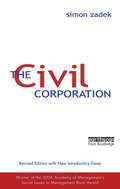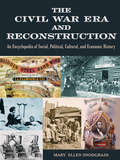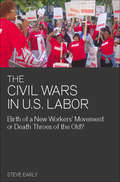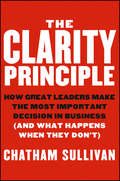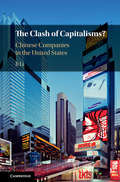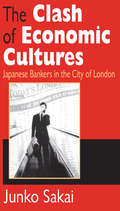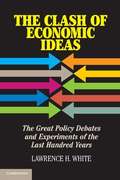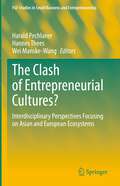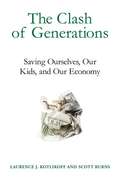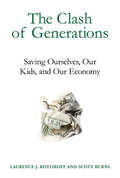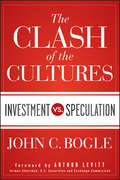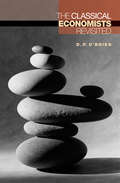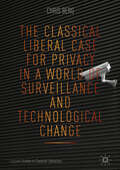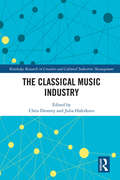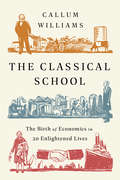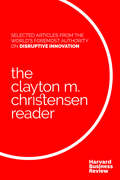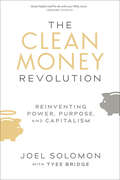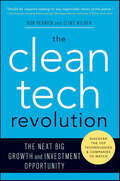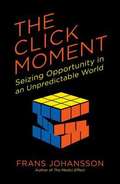- Table View
- List View
The Civil Corporation: The New Economy Of Corporate Citizenship
by Simon ZadekThe Civil Corporation is top draw reading for business professionals, management students and academics, activists and public servants. It goes to the heart of the issue of business in society, cutting through the rhetoric of campaigners and business-speak by framing the tough questions in balanced and yet provocative terms. Crucially, it connects an insightful vista of the broader landscape with a set of practical 'do's' that have stood the test of time. The book was awarded the prestigious Academy of Management's Social Issues in Management Book Award in 2006, confirming that Zadek has produced what every author aspires to: a classic book that is timely in its application.
The Civil War Era and Reconstruction: An Encyclopedia of Social, Political, Cultural and Economic History
by Mary Ellen SnodgrassThe encyclopedia takes a broad, multidisciplinary approach to the history of the period. It includes general and specific entries on politics and business, labor, industry, agriculture, education and youth, law and legislative affairs, literature, music, the performing and visual arts, health and medicine, science and technology, exploration, life on the Western frontier, family life, slave life, Native American life, women, and more than a hundred influential individuals.
The Civil Wars in U.S. Labor: Birth of a New Workers' Movement or Death Throes of the Old? (Ultimate Ser.)
by Steve Early“Should be required reading for all workers’ rights advocates.” —Bernie SandersBetween 2008 and 2010, the progressive wing of the US labor movement tore itself apart in a series of internecine struggles. More than $140 million was expended, by all sides, on organizing conflicts that tarnished union reputations and undermined the campaign for real health care and labor law reform. Campus and community allies, along with many rank-and-file union members, were left angered and dismayed.In this incisive book, labor journalist Steve Early draws on scores of interviews and on his own union organizing experience to explain why and how these labor civil wars occurred. He examines the bitter disputes about union structure, membership rights, organizing strategy, and contract standards that enveloped SEIU, UNITE HERE, the California Nurses Association, and independent organizations like the Federación de Maestros de Puerto Rico and the new National Union of Healthcare Workers in California. Along the way, we meet rank-and-file activists, local union officers, national leaders, and concerned friends of labor who were drawn into the fray, as Early considers the quest to stem the tide of the labor movement’s long decline.
The Clarity Principle
by Chatham SullivanTurf wars, low morale, bad politics, and misguided strategies: these are issues that claim much of a leader's time. But this parade of dysfunctions and messy "people" problems actually points to an organization confused about its core business, torn between competing ideas about what it is and wants to be--an organization facing an identity crisis.Strategy and leadership expert Chatham Sullivan argues that when the purpose of a business becomes confused, it is the leaders' responsibility to restore clarity, especially in the face of tough strategic choices that have political, personal, and cultural consequences for the organization. Sullivan shows leaders how to take the decisive stand that clarifies their organization's core purpose.Featuring compelling stories of leaders who have succumbed to and successfully resolved their organizations' identity crises, The Clarity Principle bridges the gap between leadership and strategy and demonstrates the tremendous gains to be achieved by leaders willing to make tough choices.
The Clash of Capitalisms?: Chinese Companies In The United States
by Ji LiChinese foreign direct investment in the United States has generated intense debates. Some welcome it for the immediate benefits such as job creation; others view Chinese investments, especially those controlled by the Chinese government, as a critical threat. The debates have so far missed an important question: how do Chinese companies investing in the US react to the host country's law? <P><P>Ji Li formulates a novel analytical framework to examine the adaptation of Chinese companies to general US institutions and their compliance with US laws governing tax, employment equality, and national security review of foreign investments. The level of compliance varies, and this variation is examined in relation to company ownership, including state ownership. Li's analysis is based on interviews and a unique and comprehensive dataset about Chinese companies in the United States that has never been systematically explored.<P> Proposes a new analytical framework for researching foreign investors' compliance with host country law.<P> Draws on a unique dataset covering almost all the largest Chinese companies in the US.<P> Combines qualitative and quantitative analysis.<P>
The Clash of Economic Cultures: Japanese Bankers in the City of London
by Junko SakaiThe globalization of the world economy today means that more and more people are experiencing working in another culture. Focusing on the real experiences of workers in Japanese transnational finance companies, this book not only throws light on this specific case, but at the same time raises timely questions and insights concerning the newly emerging multicultural work experiences world-wide. The Clash of Economic Cultures: Japanese Bankers in the City of London reflects on contemporary discussions in sociology, anthropology and cultural studies of individual global movement and cultural interaction. While there are some studies on Japanese multinational companies in Europe, they have typically assumed stereotyped differences in management systems and work cultures. This book, however, breaks the mold by looking at the culture and individuals' subjective views about their working lives and also their own worldviews; this perspective illuminates the difficulties in working relationships between Japanese and Europeans. Junko Sakai reveals, through 100 transcribed interviews, the influence of power relationships on people of different groups in terms of gender, class, and ethnicity. The Clash of Economic Cultures shows uneven transformation of economic and cultural hegemony between East and West. This book gives voice to Japanese men and women whose voices are rarely heard, and to the British who have worked for non-Westerners in the West. It is also a significant and timely analysis of the increasing influence of non-Western companies in London. It will be of great interest to cultural anthropologists, business historians, sociologists and scholars in Japanese and Asian studies, as well as those involved in international finance and management.
The Clash of Economic Ideas
by Lawrence H. WhiteThe Clash of Economic Ideas interweaves the economic history of the last hundred years with the history of economic doctrines to understand how contrasting economic ideas have originated and developed over time to take their present forms. It traces the connections running from historical events to debates among economists, and from the ideas of academic writers to major experiments in economic policy. The treatment offers fresh perspectives on laissez faire, socialism and fascism; the Roaring Twenties, business cycle theories and the Great Depression; Institutionalism and the New Deal; the Keynesian Revolution; and war, nationalization and central planning. After 1945, the work explores the postwar revival of invisible-hand ideas; economic development and growth, with special attention to contrasting policies and thought in Germany and India; the gold standard, the interwar gold-exchange standard, the postwar Bretton Woods system and the Great Inflation; public goods and public choice; free trade versus protectionism; and finally fiscal policy and public debt.
The Clash of Entrepreneurial Cultures?: Interdisciplinary Perspectives Focusing on Asian and European Ecosystems (FGF Studies in Small Business and Entrepreneurship)
by Harald Pechlaner Wei Manske-Wang Hannes TheesThis book uncovers the current knowledge on entrepreneurial cultures and the development of entrepreneurial ecosystems between Asia and Europe. Broadening the scope spatially and conceptually, the book discusses the entrepreneurial ecosystems as a system and mediator in their cultural, political, and socio-economic settings in an interdisciplinary approach. This allows a clearer perspective on stakeholders' interaction, international collaboration and competition, power relations, and political influence. The various chapters in this edited volume cover the peculiarities and differences in Asia, Europe, and Eurasia with the New Silk Road (or Belt and Road Initiative) as the bridging component. The chapters, written for researchers and policy makers interested in Asian-European cooperation, also include discussions on economic systems, globalization, and regionalization, politics, cultures, and digitalization.
The Clash of Generations
by Laurence J. Kotlikoff Scott BurnsThe United States is bankrupt, flat broke. Thanks to accounting that would make Enron blush, America's insolvency goes far beyond what our leaders are disclosing. The United States is a fiscal basket case, in worse shape than the notoriously bailed-out countries of Greece, Ireland, and others. How did this happen? In The Clash of Generations, experts Laurence Kotlikoff and Scott Burns document our six-decade, off-balance-sheet, unsustainable financing scheme. They explain how we have balanced our longer lives on the backs of our (relatively few) children. At the same time, we've been on a consumption spree, saving and investing less than nothing. And that's not to mention the evisceration of the middle class and a financial system that has proven it can't be trusted. Kotlikoff and Burns outline grassroots strategies for saving ourselves--and especially our children--from what could be a truly catastrophic financial collapse. Kotlikoff and Burns sounded the alarm in their widely acclaimed The Coming Generational Storm, but politicians didn't listen. Now the need for action is even more urgent. It's up to us to demand radical reform of our tax system, our healthcare system, and our Social Security system, and to insist on better paths to investment return than those provided by Wall Street (mis)managers. Kotlikoff and Burns's "Purple Plans" (so called because they will appeal to both Republicans and Democrats) have been endorsed by a who's who of economists and offer a new way forward; and their revolutionary investment strategy for individuals replaces the idea of financial capital with "life decision capital. " Of course, we won't be doing all this just for ourselves. We need to fix America's fiscal mess before our kids inherit it.
The Clash of Generations: Saving Ourselves, Our Kids, and Our Economy (The\mit Press Ser.)
by Laurence J. Kotlikoff Scott BurnsHow America went bankrupt and how we can save ourselves—as a country and as individuals—from economic disaster.The United States is bankrupt, flat broke. Thanks to accounting that would make Enron blush, America's insolvency goes far beyond what our leaders are disclosing. The United States is a fiscal basket case, in worse shape than the notoriously bailed-out countries of Greece, Ireland, and others. How did this happen? InThe Clash of Generations, experts Laurence Kotlikoff and Scott Burns document our six-decade, off-balance-sheet, unsustainable financing scheme. They explain how we have balanced our longer lives on the backs of our (relatively few) children. At the same time, we've been on a consumption spree, saving and investing less than nothing. And that's not to mention the evisceration of the middle class and a financial system that has proven it can't be trusted. Kotlikoff and Burns outline grassroots strategies for saving ourselves—and especially our children—from what could be a truly catastrophic financial collapse.Kotlikoff and Burns sounded the alarm in their widely acclaimedThe Coming Generational Storm, but politicians didn't listen. Now the need for action is even more urgent. It's up to us to demand radical reform of our tax system, our healthcare system, and our Social Security system, and to insist on better paths to investment return than those provided by Wall Street (mis)managers. Kotlikoff and Burns's "Purple Plans" (so called because they will appeal to both Republicans and Democrats) have been endorsed by a who's who of economists and offer a new way forward; and their revolutionary investment strategy for individuals replaces the idea of financial capital with "life decision capital."Of course, we won't be doing all this just for ourselves. We need to fix America's fiscal mess before our kids inherit it.https://www.youtube.com/watch?v=IMKw76lBn0k&feature=youtube_gdata_player
The Clash of the Cultures: Investment vs. Speculation
by John C. BogleRecommended Reading by Warren Buffet in his March 2013 Letter to Shareholders How speculation has come to dominate investment—a hard-hitting look from the creator of the first index fund. Over the course of his sixty-year career in the mutual fund industry, Vanguard Group founder John C. Bogle has witnessed a massive shift in the culture of the financial sector. The prudent, value-adding culture of long-term investment has been crowded out by an aggressive, value-destroying culture of short-term speculation. Mr. Bogle has not been merely an eye-witness to these changes, but one of the financial sector’s most active participants. In The Clash of the Cultures, he urges a return to the common sense principles of long-term investing. Provocative and refreshingly candid, this book discusses Mr. Bogle's views on the changing culture in the mutual fund industry, how speculation has invaded our national retirement system, the failure of our institutional money managers to effectively participate in corporate governance, and the need for a federal standard of fiduciary duty. Mr. Bogle recounts the history of the index mutual fund, how he created it, and how exchange-traded index funds have altered its original concept of long-term investing. He also presents a first-hand history of Wellington Fund, a real-world case study on the success of investment and the failure of speculation. The book concludes with ten simple rules that will help investors meet their financial goals. Here, he presents a common sense strategy that "may not be the best strategy ever devised. But the number of strategies that are worse is infinite." The Clash of the Cultures: Investment vs. Speculation completes the trilogy of best-selling books, beginning with Bogle on Investing: The First 50 Years (2001) and Don't Count on It! (2011)
The Classical Debt: Greek Antiquity in an Era of Austerity
by Johanna Hanink“Greek debt” means one thing to the country’s creditors. But for millions who prize culture over capital, it means the symbolic debt we owe Greece for democracy, philosophy, mathematics, and fine art. Johanna Hanink shows that our idealized image of ancient Greece dangerously shapes our view of the country’s economic hardship and refugee crisis.
The Classical Economists Revisited
by D. P. O'BrienThe Classical Economists Revisited conveys the extent, diversity, and richness of the literature of economics produced in the period extending from David Hume's Essays of 1752 to the final contributions of Fawcett and Cairnes in the 1870s. D. P. O'Brien thoroughly updates, rewrites, and expands the vastly influential work he first published in 1975, The Classical Economists. In particular, he sets out to make clear the shaping of a comprehensive vision of the working of an open economy, building on the great work of Adam Smith in Wealth of Nations, a development that was substantially affected by the contributions of David Ricardo. He shows that the Classical literature was in fact the work of a host of thinkers from a wide range of backgrounds. Covering the intellectual roots of the Classical literature and its methodological approaches, and the developed theories of value, distribution, money, trade, population, economic growth, and public finance, and examining the Classical attitudes toward a rich variety of policy issues, The Classical Economists Revisited considers not only the achievements of the Classical writers but also their legacy to the later development of economics. A seminal contribution to the field, this book will be treasured for many years to come by economists, historians of economics, instructors and their students, and anyone interested in the sweeping breadth and enduring influence of the classical economists.
The Classical Liberal Case for Israel
by Walter E. Block Alan G. FutermanThis book offers a unique perspective on the State of Israel based on classical liberalism, both on a historical and theoretical level. Specifically, it makes a classical liberal and libertarian analysis based upon homesteading and private property rights to defend the State of Israel. As such, this work explores the history of the Jewish State, both to provide a positive case for its right to exist, and to clarify the myths surrounding its origin and development. At the same time, it deals with other relevant related subjects, such as the complex situation between Israel and the Palestinian Arabs, the military campaigns against the Jewish State, the connection between anti-Zionism and anti-Semitism, and Israel’s economic miracle. The thorough analysis presented in this work intends to show not only why the voices and movements against Israel are wrong (including the Boycott, Divestment and Sanctions movement, BDS), but more importantly, why Israel is an example of human flourishing and freedom that every advocate for liberty should celebrate. The Classical Liberal Case for Israel makes the practical and moral case for Israel. It is based on truths and facts that need to be repeated over and over. Block & Futerman understand that the only way to defeat a big lie is with a big truth. Benjamin Netanyahu, Prime Minister of the State of Israel, Jerusalem, Israel Classical Liberalism, often associated with the spread West from Northern Europe in creating free nations, is argued here as applying to Israel, with ancient roots in the principles of human freedom. Vernon L. Smith, Ph.D. Nobel Prize in Economic Sciences (2002), and Professor, George L. Argyros Endowed Chair in Finance and Economics, Professor of Economics and Law, Smith Institute for Political Economy and Philosophy, at Chapman University.
The Classical Liberal Case for Privacy in a World of Surveillance and Technological Change (Palgrave Studies in Classical Liberalism)
by Chris BergHow should a free society protect privacy? Dramatic changes in national security law and surveillance, as well as technological changes from social media to smart cities mean that our ideas about privacy and its protection are being challenged like never before. In this interdisciplinary book, Chris Berg explores what classical liberal approaches to privacy can bring to current debates about surveillance, encryption and new financial technologies. Ultimately, he argues that the principles of classical liberalism – the rule of law, individual rights, property and entrepreneurial evolution – can help extend as well as critique contemporary philosophical theories of privacy.
The Classical Music Industry (Routledge Research in Creative and Cultural Industries Management)
by Chris Dromey Julia HaferkornThis volume brings together academics, executives and practitioners to provide readers with an extensive and authoritative overview of the classical music industry. The central practices, theories and debates that empower and regulate the industry are explored through the lens of classical music-making, business, and associated spheres such as politics, education, media and copyright. The Classical Music Industry maps the industry’s key networks, principles and practices across such sectors as recording, live, management and marketing: essentially, how the cultural and economic practice of classical music is kept mobile and alive. The book examining pathways to professionalism, traditional and new forms of engagement, and the consequences of related issues—ethics, prestige, gender and class—for anyone aspiring to ‘make it’ in the industry today. This book examines a diverse and fast-changing sector that animates deep feelings. The Classical Music Industry acknowledges debates that have long encircled the sector but today have a fresh face, as the industry adjusts to the new economics of funding, policy-making and retail The first volume of its kind, The Classical Music Industry is a significant point of reference and piece of critical scholarship, written for the benefit of practitioners, music-lovers, students and scholars alike offering a balanced and rigorous account of the manifold ways in which the industry operates.
The Classical School: The Birth of Economics in 20 Enlightened Lives
by Callum WilliamsA fascinating chronicle of the lives of 20 economists who played major roles in the evolution of global economic thought.What was Adam Smith really talking about when he mentioned the "invisible hand"? Did Karl Marx really predict the end of capitalism? Did Thomas Malthus (from whose name the word "Malthusian" derives) really believe that famines were desirable?In The Classical School, Callum Williams debunks popular myths about these great economists, and explains the significance of their ideas in an engaging way. After reading this book, you will know much more about the very famous (Smith, Ricardo, Mill) and the not-quite-so-famous (Bernard de Mandeville, Friedrich Engels, Jean-Baptiste Say). The book offers an assessment of what they wrote, the impact it had, and the worthiness of their ideas. It's far from the final word on any of these people, but a useful way of understanding what they were all about, at a time when understanding these economic giants is perhaps more important than ever.
The Clayton M. Christensen Reader
by Clayton M. ChristensenThe best of Clayton Christensen's seminal work on disruptive innovation, all in one place.No business can afford to ignore the theory of disruptive innovation. But the nuances of Clayton Christensen's foundational thinking on the subject are often forgotten or misinterpreted. To achieve continuing growth in your business while defending against upstarts, you need to understand clearly what disruption is and how it works, and know how it applies to your industry and your company. In this collection of Christensen's most influential articles-carefully selected by Harvard Business Review's editors-his incisive arguments, clear theories, and readable stories give you the tools you need to understand disruption and what to do about it. The collection features Christensen's newest article looking back on 20 years of disruptive innovation: what it is, and what it isn't.Covering a broad spectrum of topics-business model innovation, mergers and acquisitions, value-chain shifts, financial incentives, product development-these articles illuminate the impact and implications of disruptive innovation as well as Christensen's broader thinking on management theory and its application in business and in life.This collection of best-selling articles includes: "Disruptive Technologies: Catching the Wave," by Joseph L. Bower and Clayton M. Christensen, "Meeting the Challenge of Disruptive Change," by Clayton M. Christensen and Michael Overdorf, "Marketing Malpractice: The Cause and the Cure," by Clayton M. Christensen, Scott Cook, and Taddy Hall, "Innovation Killers: How Financial Tools Destroy Your Capacity to Do New Things," by Clayton M. Christensen, Stephen P. Kaufman, and Willy C. Shih, "Reinventing Your Business Model," by Mark W. Johnson, Clayton M. Christensen, and Henning Kagermann, "The New M&A Playbook," by Clayton M. Christensen, Richard Alton, Curtis Rising, and Andrew Waldeck, "Skate to Where the Money Will Be," by Clayton M. Christensen, Michael E. Raynor, and Matthew Verlinden, "Surviving Disruption," by Maxwell Wessel and Clayton M. Christensen, "What Is Disruptive Innovation?" by Clayton M. Christensen, Michael E. Raynor, and Rory McDonald, "Why Hard-Nosed Executives Should Care About Management Theory," by Clayton M. Christensen and Michael E. Raynor, and "How Will You Measure Your Life?" by Clayton M. Christensen.
The Clean Hydrogen Economy and Saudi Arabia: Domestic Developments and International Opportunities (Routledge Explorations in Environmental Economics)
by Rami Shabaneh Jitendra Roychoudhury Jan Frederik Braun Saumitra SaxenaThis book provides a first-of-its-kind analysis of the emerging global hydrogen economy from the vantage point of one of the world’s biggest energy providers: Saudi Arabia. In 2021, and within the context of the Circular Carbon Economy framework, Saudi Arabia announced its goal to reach net-zero carbon emissions by 2060 and produce a substantial amount of clean hydrogen annually by 2030. The Kingdom is optimally situated geographically between the major demand markets in Europe and North Asia, from where it can leverage clean hydrogen exports as a potential tool to become a player of strategic importance and successfully diversify its economy under its Vision 2030 program. More broadly, the book charts a course for fossil fuel-exporting countries such as Saudi Arabia to carve a competitive position for themselves over the forthcoming decades using clean hydrogen as a catalyst for the energy transition.With contributions from global energy experts, the chapters in this book provide a multifaceted analysis of the "who," "what," "where," and "why" related to clean hydrogen development within and beyond Saudi Arabia. Collectively, the contributions analyze the countries and regions relevant to Saudi Arabia in terms of dedicated hydrogen policies, projects, and approaches that aim to incentivize production and demand in an increasingly carbon-constrained world. The book is a timely, unique and an indispensable resource for practitioners and students of energy, geopolitics, and climate policy working on hydrogen in academia, applied research, national government bodies, and international organizations.
The Clean Money Revolution: Reinventing Power, Purpose, and Capitalism
by Joel Solomon Tyee Bridge“[Joel is] a beloved local financial superhero, and this book is a brilliant roadmap to purposeful investing.” —Catherine Ludgate, Manager of Community Investment, VancityBy 2050, $50 trillion will change hands in North America in the largest generational wealth transfer ever. It will remake the world and be the biggest money-making opportunity in history.“Business as usual,” founded on exploitation and environmental ruin, is over. Climate catastrophe, reactionary politics, and widening inequity have put the world on edge. Meanwhile innovations are shifting the economic ground, and an entire generation is pounding the table for real change. Capitalism is evolving into a force that can restore the planet, transform the global economy, and bring justice to people.Joel Solomon, impact investor and change agent, lays it on the line. The Clean Money Revolution is part memoir of an inspiring thought leader’s journey from presidential campaigner to pioneering investor, part insider’s guide to the businesses remaking the world, and part manifesto for a new vision of profit, power, and purpose.Meet some of the people behind this massive shift, and discover the role you can play in the $50-trillion movement toward true prosperity. A must-read for investors, wealth advisors, aspiring entrepreneurs, and all who want their values and money to work together to transform the future.The Clean Money Revolution is on. Join it!“Good helpful stuff to do with your filthy lucre.” —Margaret Atwood, author of The Handmaid’s Tale“Joel Solomon so eloquently lights the path society needs to take in order to ensure future generations can flourish on a sustainable planet earth.” —Reverend Yearwood, President of the Hip Hop Caucus
The Clean Tech Revolution: The Next Big Growth and Investment Opportunity
by Clint Wilder Ron PernickWhen industry giants such as GE, Toyota, and Sharp and investment firms such as Goldman Sachs are making multibillion-dollar investments in clean technology, the message is clear. Developing clean technologies is no longer a social issue championed by environmentalists; it's a moneymaking enterprise moving solidly into the business mainstream. In fact, as the economy faces unprecedented challenges from high energy prices, resource shortages, and global environmental and security threats, clean tech—technologies designed to provide superior performance at a lower cost while creating significantly less waste than conventional offerings—promises to be the next engine of economic growth.In The Clean Tech Revolution, authors Ron Pernick and Clint Wilder identify the major forces that have pushed clean tech from back-to-the-earth utopian dream to its current revolution among the inner circles of corporate boardrooms, on Wall Street trading floors, and in government offices around the globe. By highlighting eight major clean-tech sectors—solar energy, wind power, biofuels and biomaterials, green buildings, personal transportation, the smart grid, mobile applications, and water filtration—they uncover how investors, entrepreneurs, and individuals can profit from this next wave of technological innovation. Pernick and Wilder shine the spotlight on the winners among technologies, companies, and regions that are likely to reap the greatest benefits from clean tech—and they show you why the time to act is now.Groundbreaking and authoritative, The Clean Tech Revolution is the must-read book to understand and profit from the clean technologies that are reshaping our fast-changing world.
The Click Moment
by Frans JohanssonOn the one hand we aren't surprised by the uncertainty of everyday life, but on the other we believe that success can be analyzed and planned for. It is a revealing paradox. The implications are explosive and they obliterate every common-sense notion we have about strategy and planning. The Click Moment is about two very simple but highly provocative ideas. The first is that success is random--far more random than we would like to believe. The second is that there are a number of specific actions that we, as individuals and organizations, can take to capture this randomness and focus it in our favor. According to Johansson, strategy, planning, and careful analysis can no longer guarantee strong performance; today's business environments are far too random and complicated. But when you dig deep into the actions of successful people and organizations, you'll find one common theme. A turning point occurs--a major client signs on, a new competitor redefines the market, an unlikely idea surfaces--and they take advantage of that serendipity to change their fate. Consider how . . . Diane von Furstenberg saw Julie Nixon Eisenhower on TV wearing a matching skirt and top, and the timeless, elegant wrap-dress was born. Microsoft Windows was on the brink of being shut down until two individuals met unexpectedly at a party and altered the fate of the world's dominant computer operating system. Starbucks sold high-end brewing equipment and coffee by the pound until Howard Schultz experienced his first latte in a café in Milan. Nike was stumped on how to invent a spikeless trainer when a legendary running coach poured latex on a waffle iron. Each of these individuals experienced a "click moment"--a rare point of opportunity that was completely unexpected. But they capitalized on their luck in ways that paid off significantly and altered their organizations' strategies and the course of their lives. Johansson uses stories of successful people and companies throughout history to illustrate the specific actions we can take to create more click moments, place lots of high-potential bets, open ourselves up to chance encounters, and harness the complex forces of success that follow.
The Click Moment
by Frans JohanssonIn the story of every great company and career, there is one defining moment when luck and skill collide. This book is about making that moment happen.According to Frans Johansson's research, successful people and organizations show a common theme. A lucky moment occurs and they take advantage of it to change their fate. Consider how Diane von Furstenberg saw Julie Nixon Eisenhower on TV wearing a matching skirt and top, and created the timeless, elegant wrap-dress.That was a "click moment" of unexpected opportunity. Johansson uses stories from throughout history to illustrate the specific actions we can take to create more click moments, place lots of high-potential bets, open ourselves up to chance encounters, and harness the complex forces of success that follow.nd they take advantage of that serendipity to change their fate. Consider how . . . Diane von Furstenberg saw Julie Nixon Eisenhower on TV wearing a matching skirt and top, and the timeless, elegant wrap-dress was born. Microsoft Windows was on the brink of being shut down until two individuals met unexpectedly at a party and altered the fate of the world's dominant computer operating system. Starbucks sold high-end brewing equipment and coffee by the pound until Howard Schultz experienced his first latte in a café in Milan. Nike was stumped on how to invent a spikeless trainer when a legendary running coach poured latex on a waffle iron.Each of these individuals experienced a "click moment"--a rare point of opportunity that was completely unexpected. But they capitalized on their luck in ways that paid off significantly and altered their organizations' strategies and the course of their lives. Johansson uses stories of successful people and companies throughout history to illustrate the specific actions we can take to create more click moments, place lots of high-potential bets, open ourselves up to chance encounters, and harness the complex forces of success that follow.
The Click Moment: Seizing Opportunity in an Unpredictable World
by Frans JohanssonOn the one hand we aren’t surprised by the uncertainty of everyday life, but on the other we believe that success can be analyzed and planned for. It is a revealing paradox. The implications are explosive and they obliterate every common-sense notion we have about strategy and planning. The Click Moment is about two very simple but highly provocative ideas. The first is that success is random—far more random than we would like to believe. The second is that there are a number of specific actions that we, as individuals and organizations, can take to capture this randomness and focus it in our favor. According to Johansson, strategy, planning, and careful analysis can no longer guarantee strong performance; today’s business environments are far too random and complicated. But when you dig deep into the actions of successful people and organizations, you’ll find one common theme. A turning point occurs—a major client signs on, a new competitor redefines the market, an unlikely idea surfaces—and they take advantage of that serendipity to change their fate. Consider how . . . Diane von Furstenberg saw Julie Nixon Eisenhower on TV wearing a matching skirt and top, and the timeless, elegant wrap-dress was born. Microsoft Windows was on the brink of being shut down until two individuals met unexpectedly at a party and altered the fate of the world’s dominant computer operating system. Starbucks sold high-end brewing equipment and coffee by the pound until Howard Schultz experienced his first latte in a café in Milan. Nike was stumped on how to invent a spikeless trainer when a legendary running coach poured latex on a waffle iron. Each of these individuals experienced a “click moment”—a rare point of opportunity that was completely unexpected. But they capitalized on their luck in ways that paid off significantly and altered their organizations’ strategies and the course of their lives. Johansson uses stories of successful people and companies throughout history to illustrate the specific actions we can take to create more click moments, place lots of high-potential bets, open ourselves up to chance encounters, and harness the complex forces of success that follow. .
